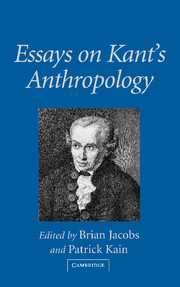Book contents
- Frontmatter
- Contents
- Contributors
- Essays on Kant's Anthropology
- 1 Introduction
- 2 Historical Notes and Interpretive Questions about Kant's Lectures on Anthropology
- 3 Kant and the Problem of Human Nature
- 4 The Second Part of Morals
- 5 The Guiding Idea of Kant's Anthropology and the Vocation of the Human Being
- 6 Kantian Character and the Problem of a Science of Humanity
- 7 Beauty, Freedom, and Morality: Kant's Lectures on Anthropology and the Development of His Aesthetic Theory
- 8 Kant's Apology for Sensibility
- 9 Kant's “True Economy of Human Nature”: Rousseau, Count Verri, and the Problem of Happiness
- 10 Prudential Reason in Kant's Anthropology
8 - Kant's Apology for Sensibility
Published online by Cambridge University Press: 19 July 2009
- Frontmatter
- Contents
- Contributors
- Essays on Kant's Anthropology
- 1 Introduction
- 2 Historical Notes and Interpretive Questions about Kant's Lectures on Anthropology
- 3 Kant and the Problem of Human Nature
- 4 The Second Part of Morals
- 5 The Guiding Idea of Kant's Anthropology and the Vocation of the Human Being
- 6 Kantian Character and the Problem of a Science of Humanity
- 7 Beauty, Freedom, and Morality: Kant's Lectures on Anthropology and the Development of His Aesthetic Theory
- 8 Kant's Apology for Sensibility
- 9 Kant's “True Economy of Human Nature”: Rousseau, Count Verri, and the Problem of Happiness
- 10 Prudential Reason in Kant's Anthropology
Summary
The “Apology for Sensibility” that constitutes sections 8–11 of the Anthropology from a Pragmatic Point of View (1798) offers a summary justification for one of the most important innovations of Kant's critical philosophy. Without the invention and justification of Sinnlichkeit or “sensibility” the concept of experience informing the Critique of Pure Reason and the critique of traditional metaphysics based upon it would not have been possible and Kant's philosophy would have remained a footnote to the then prevailing Leibniz-Wolff system of philosophy. Indeed, when his contemporary Eberhard claimed that everything in the critical philosophy had already been said by Leibniz and Wolff, Kant defended the originality of his contribution in terms of the “infinite difference between the theory of sensibility, as a particular mode of intuition” and one that regards sensibility as the “imprecise representation of an intellectual intuition.” Yet the doctrine of sensibility is itself internally complex, drawing together diverse lines and styles of arguments ranging across the disciplines of aesthetics, logic, metaphysics, psychology, politics, and ethics. In order to invent an integrated doctrine of sensibility it was necessary for Kant to find a space for reflection free from the limits imposed by these disciplines. Such a space was opened in the lecture course on anthropology that Kant offered for the first time in 1772–3 and which served as the crucible for the integrated doctrine of sensibility central to the critical philosophy.
- Type
- Chapter
- Information
- Essays on Kant's Anthropology , pp. 164 - 193Publisher: Cambridge University PressPrint publication year: 2003
- 11
- Cited by



